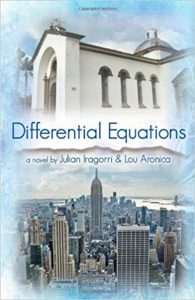On Friday, we shared our review of Differential Equations, by Julian Iragorri and Lou Aronica. You can read our review here.
Today, we are excited to bring you a guest post from Lou Aronica, one of the authors of Differential Equations, where he tells us about the inspiration for the book and more about magic realism. Aronica is a New York Times best selling author and President and Publisher of The Fiction Studio and Publisher of The Story Plant. You can learn more about him here.
_____
 Differential Equations, the novel Julian Iragorri and I just published, had numerous sources of inspiration. Julian’s family story was one, as was the fact that both of us had some mind/body experience. Another key source of inspiration were the magic realists. I knew that Julian and I could collaborate well when I learned in our first conversation that both of us considered Gabriel Garcia Marquez’s One Hundred Years of Solitude a favorite novel. Further conversation revealed a shared affection for Isabel Allende, Jorge Amado, and others. I’d wanted to write a magic realist novel for some time, and with Julian I would finally get the chance to do so.
Differential Equations, the novel Julian Iragorri and I just published, had numerous sources of inspiration. Julian’s family story was one, as was the fact that both of us had some mind/body experience. Another key source of inspiration were the magic realists. I knew that Julian and I could collaborate well when I learned in our first conversation that both of us considered Gabriel Garcia Marquez’s One Hundred Years of Solitude a favorite novel. Further conversation revealed a shared affection for Isabel Allende, Jorge Amado, and others. I’d wanted to write a magic realist novel for some time, and with Julian I would finally get the chance to do so.
I’d incorporated the fantastic in my work before. My novel Blue has an entire storyline set in the imaginary world created by a father and his daughter when the girl was much younger. Magic realism is different from fantasy, though. In magic realist fiction, the world is very much the same as ours except that magical things happen as a matter of course. These things aren’t phenomena; they are just the way the world works. For example, Vidente, one of the main characters in Differential Equations is someone who can genuinely see the future. Her friends and neighbors come to her when they feel the need to know what is going to happen to them. They see Vidente as someone with a gift, much like a baker or a tailor has a gift, but not as someone charmed by the supernatural.
What I love about magic realism is its ability to extend the natural world rather than diverge from it. As a novelist, this medium provides me with an extra set of tools, and it is liberating. It is as though a painter were provided with new colors. By allowing certain types of magic to seem completely real, I can create new opportunities for drama and new methods for exploring a story’s themes. For example, in her very first scene in Differential Equations, Vidente sees a vision of her imminent death. Without this, she would have approached the events in the story in a completely different – and, in our opinion, less meaningful – way. Toward the end of the novel, a magical event allows the novel’s primary message to get through to both the characters and readers. That moment would have been much less dramatic otherwise.
When done respectfully, magic realism has the ability to illuminate experience. Those who inspired us to write Differential Equations were masters at it. I hope we did them proud.
Lou Aronica

Leave a Reply